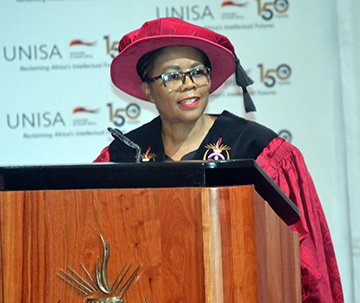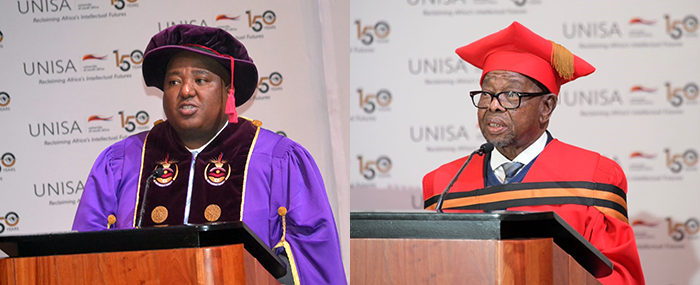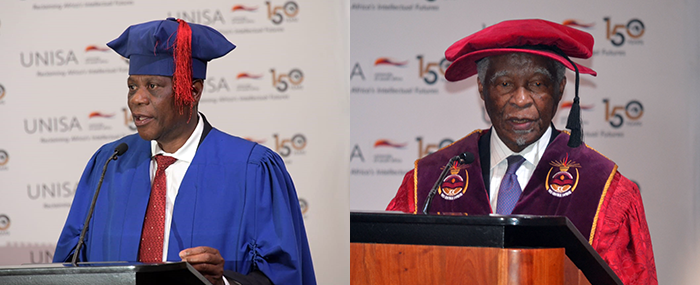News & Media
A university that has stood the test of time

Professor Puleng LenkaBula
The cradle of South Africa's higher education system, Unisa, held an august and memorable 150th-anniversary celebratory event on 26 June 2023, highlighting the university's commitment to ensuring access to education to a diverse community on the African continent and globally. The occasion was graced by conspicuous guests such as government dignitaries, media personalities, cultural leaders, and higher education officials. Held at its Muckleneuk Campus in Pretoria and virtually, the university reflected on its contribution to the education landscape locally and globally since its inception in 1873.
In her welcoming address, Professor Puleng LenkaBula, Unisa's Principal and Vice-Chancellor (VC), acknowledged Unisa as the mother of distance education that ranks in the top ten universities in South Africa and one of the leading universities on the African continent. "Unisa is a national treasure that has shaped the futures of students, thought leaders and change-makers in the knowledge production, political and economic systems, locally, continentally and globally," she asserted.
LenkaBula further noted that Unisa is accessible to all, including the poor, working-class, and geographically marginalised communities. She said: "Unisa has made an indelible mark in the quest for a better quality of life, culture, and the self-realisation of the people." The VC added that as the university marches to its next 150 years, it was necessary to reflect honestly and critically about the history and place of the university nationally and on the African continent's future.

From the left: Mashukudu Maboa and Dr Blade Nzimande
Taking Unisa to greater heights
The Chairperson of Unisa Council, Mashukudu Maboa, remarked that the celebration was a moment where the university's reflections should transcend the immediate past years as it casts its eyes farther and broader and marvelling with pride at the trailblazing footprint it left on the education landscape, locally and globally. Maboa affirmed that for the past 150 years, Unisa had shaped futures in the service of humanity.
He added that the university continues to produce quality graduates who successfully lead society in academia, commerce, politics, and other fields. He continued: "This celebratory moment demonstrates that Unisa is still standing strong, regardless of the challenges it may be facing. We have the will, expertise, and commitment to turn things around and take this institution to greater heights."
Universities encouraged to produce knowledge creators
South African Minister of Higher Education, Science and Technology, Dr Blade Nzimande, said: "Unisa’s core values embrace ethical and collective responsibility, integrity, innovation and excellence, and its belief in dignity in diversity.” Nzimande further acknowledged that through, among others, examining knowledge production and epistemologies, Unisa endeavours to decolonise the curriculum.
As the university strengthens itself further, Nzimande encouraged it to reflect on its role in combatting societal ills. “Even though Unisa is an open distance learning institution, it educates many young people with the potential to lead the world with necessary skills,” he noted. He further encouraged institutions of higher learning to produce students that are knowledge producers instead of just knowledge recipients.

From the left: His Excellency Paul Mashatile and Dr Thabo Mbeki
Unisa is accessible to all
South African Deputy President, His Excellency Paul Mashatile, remarked that government invests towards a transformed education system where education can be accessible from foundation to higher education phases and to people from all walks of life. He, therefore, lauded Unisa’s inclusivity and accessibility, indicating that the university overcomes geographical borders. “Additionally,” he added: “as Unisa sets new goals, we must work together to address our country’s poor literacy, lack of skills and high dropout rates at higher education institutions, among others.”
Mashatile also appreciated Unisa for prioritising African leadership and its development through its curriculum. He urged: “As we celebrate this 150-year milestone, let us remember and honour students who contributed to making this university successful. Let us also commit ourselves to building a more conducive and just society.”
Enabling African universities to achieve the Africa we want
Former South African President and Unisa Chancellor, Dr Thabo Mbeki, acknowledged that Unisa must address shortfalls that it is experiencing but not cease to protect its identity. Mbeki encouraged Unisa’s stakeholders to unite to ensure that the university overcomes challenges and lives up to the expectations it has created by its 150th-anniversary.
Recognising the need for an African knowledge society to achieve the ‘Africa we want by 2063’, as envisioned on the African Union Agenda 2063, Mbeki reiterated the need to signal the commitment of Africa’s political leadership to provide the resources that can enable African universities to play its role in society.
As part of the celebration, the university also unveiled its 150th-anniversary plague and revealed its Rose Mmabatho, which, among others, demonstrates that the university is the mother of other higher education institutions and hopes to inspire future generations to seek academic excellence. The Unisa 150 Choir, and South African musicians, Simphiwe Dana and Ami Faku entertained the crowd with outstanding musical performances.
In closing, Mathabo Nakene-Mginqi, Unisa’s Vice-Principal: Information and Communication Technology, delivered a vote of thanks and concluded: “Unisa is a shining example of quality universal education accessible to all Africans of diverse backgrounds.”
[WATCH] A recording of Unisa's 150th birthday celebration
#Unisa150
* By Nancy Legodi, Acting Senior Journalist, Department of Institutional Advancement
Publish date: 2023/06/27

 Unisa co-hosts G20 community outreach in the Eastern Cape
Unisa co-hosts G20 community outreach in the Eastern Cape
 Unisans gain membership of prestigious science academies
Unisans gain membership of prestigious science academies
 Advocating for disability transformation through servant leadership
Advocating for disability transformation through servant leadership
 Unisa Press continues to illuminate the publishing space
Unisa Press continues to illuminate the publishing space